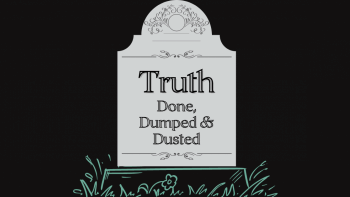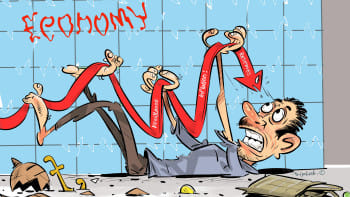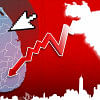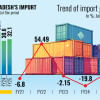Lifespan of the Leviathan

One can't go unnoticed in this day and age. One can't live in shadows, or be unheard; the edges of visibility have expanded and have collapsed the surreptitious and the stealth. Every whisper is a bleat; every breath is pronounced. Life is being like in a live theatre, exposed to the onlookers, either to be booed or loved for the duration of whatever our lives, lies and loves are worth. There's a rampant cancel culture, lest one publicly shares preferences that don't go down well. Opinions must hinge on the balance principle. Yet, while all over the world society is more critical than ever before, governance goes unnoticed and state-building continues to be a failed exercise.
The voices siding with the unusual and extraordinary don't have the bandwidth of crossing the neighbourhood or one's own social media page. Op-eds are carefully penned, lest they risk the wrath of the Leviathan. The contemporary discourse being hosted in electronic media bends towards an extreme bias, with competing pitches bordering on onscreen violence and impropriety accompanied by democratic intolerance being all out to shame all lessons learnt from History.
Opinion is no more a natural claim; it is tailored by a structured refrain, constructed through a careful exercise of blatant advertisements of self-proclaimed pace of growth, fuelled by fanatics from despotic corners, throttled by a concocted, fabricated notion of progress.
Freedom, for the most part, walks through the narrowest corridors while Fear lurks in every block. Only the blind walk unchained, since they have neither witnessed the unbridled blood-drenched trail of falsehood, nor realised that the stench comes from home. Nightingales have had their vocal cords removed in the dark expectation of having their throats slit. Sight has retreated to liminal spaces with the only hope of backrooms chasing the light away.
The megaphones all over the world are travesties of any decent world order. Either it's the bandwagon of despots writing the playbook of autocracy or it's the launch of a new episodic wave of human rights abuses. Somewhere, some master players are conspiring to make sure that they rule forever, in whichever lands they rule. Somewhere, somehow the conjurers of evil have made sure that they have full control over media, wealth, and a constant narrative of growth. Economies fail, politics plunge to ever newer lows and moral infrastructure is at a loss. Corruption is quickly brushed under the carpet; criticism is met with flack; the media is tasked to mask all bigotry.
It seems this entire civilisation of ours has sunk to the depths of an inescapable inferno of war-mongers who report to hyper-nationalism, align with the soft powers that push countries to unimaginable debt traps, claim regional camaraderie, continue seeking external endorsement and, at the end, pull through one way or the other.
What happens to the collective national memory of lands which have lived through wars, hunger, flood, poverty, and still managed to turn around in democracy? Apparently nations that have memories of democracy can never suffer from dementia. Apparently there are civil societies that awaken when they are pushed too far beyond.
Where is History in all this? History cannot be our destiny, but we could certainly learn from it, if we wanted to.
We could remember how the "Great Elector" of Prussia, Frederick William I, whose rule began in 1640, and who, after having ruled Brandenburg-Prussia for more than 48 years, believed that the strengthening of the state and the expansion of its power could only come from "one brain." As a result, Prussia went on to collect more taxes, raised revenue, went to war, controlled society more and yet lost out on nation-building just because society was nowhere to be seen.
On the contrary, the Swiss resisted the Habsburgs by uniting all the cantons, and by allowing the peasants to become autonomous. The Swiss started with watches, then moved on to the machine tools industry, pharma, chocolates, and cheese. By "going Swiss," the Swiss ended up having the highest per capita income than any other European state.
In both of the above cases, it was war that propelled statehood. But in one, society was ignored and in the other, the Swiss society and the state together built one of the most vibrant democracies in Europe.
We could also remind ourselves of the Chile that said "no" to Pinochet in 1990 and transitioned to democracy; we could remember Lech Walesa who, after defeating Jaruzelski, led the country to democracy, led the polish parliament with 28 different political parties, and finally inked a compromise, so that the government, the trade union, and and the management could talk together and build the nation. That talk itself created a safe transit to democracy.
But what does one do with history? What happens to the collective national memory of lands which have lived through wars, hunger, flood, poverty, and still managed to turn around in democracy? Apparently nations that have memories of democracy can never suffer from dementia. Apparently there are civil societies that awaken when they are pushed too far beyond. But times have changed…
Who would want to move for democracy and risk losing it all?
Remember there was one Litvinenko, an operative in Russia's Federal Security Bureau, who shared his horrors of secret services with Putin, who listened to him attentively, and the next day opened a file on him? Litvinenko, having no option, fled from his own country for fear of his life in 2000 and then was poisoned six years later by two ex-KGB agents in London while having a cup of tea with them, which resulted in his death three weeks later of polonium-210-induced radiation syndrome.
Truth be known: the Czech President and the playwright, Vaclav Havel's "The Power of the Powerless" has fallen prey to erasure while Machavelli's prediction of the despaired common people giving their support to "one man, so as to to be defended by his authority" stands erect in total audacity.
Therefore, untouched despots live and thrive in the association of braggarts, undeterred, and confident of survival and absolute power.
Dr Rubana Huq is vice-chancellor of Asian University for Women.
Views expressed in this article are the author's own.
Follow The Daily Star Opinion on Facebook for the latest opinions, commentaries and analyses by experts and professionals. To contribute your article or letter to The Daily Star Opinion, see our guidelines for submission.

 For all latest news, follow The Daily Star's Google News channel.
For all latest news, follow The Daily Star's Google News channel. 










Comments